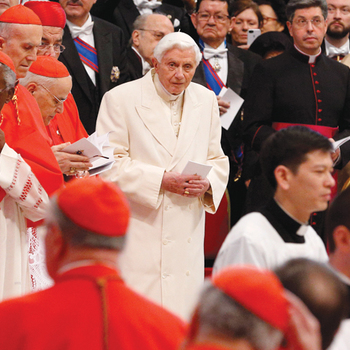Abuse Crisis Rooted in ‘egregious’ Social Changes, Retired Pope Says
By Carol Glatz
The clerical sexual abuse crisis is rooted in the “egregious event” of the cultural and sexual revolution in the Western world in the 1960s and a collapse of the existence and authority of absolute truth and God, retired Pope Benedict XVI writes in an article outlining his thoughts on what must be done now. The retired pope said the primary task at hand is to reassert the joyful truth of God’s existence and of the church as holding the true deposit of faith. “When thinking about what action is required first and foremost, it is rather obvious that we do not need another church of our own design. Rather, what is required first and foremost is the renewal of the faith in the reality of Jesus Christ given to us in the Blessed Sacrament,” he wrote. The pope’s remarks, presented as a compilation of “some notes,” were to be published in Klerusblatt, a German-language Catholic monthly journal for clergy in Bavaria. Several news outlets released their translations of the text early April 11. Given the February Vatican gathering of presidents of the world’s bishops’ conferences “to discuss the current crisis of faith and of the church,” and given his role as pope during “the public outbreak of the crisis,” the retired pope felt it appropriate he also help contribute “to a new beginning,” he said. Pope Benedict added that he contacted Pope Francis and Cardinal Pietro Parolin, Vatican secretary of state, before releasing the article. The retired pope, who turns 92 April 16, led the universal church from 2005 to 2013 and for 23 years before that headed the Congregation for the Doctrine of the Faith, which is charged with handling cases of the abuse of minors by priests. He also served as a theological consultant during the Second Vatican Council, between 1962 and 1965. Beginning in the late 1960s, while Western society at large was facing the “death” or disappearance of God and any moral compass, he said, the church’s own moral theology suffered “a collapse that rendered the church defenseless against these changes in society.” A misreading of the Second Vatican Council, he said, shifted the church’s understanding of revelation, resulting in a diluted or shape-shifting morality that was no longer grounded in natural law and the existence of absolute good and evil; morality could only make “relative value judgments” contingent on the moment and circumstances, he wrote. “Indeed, in many parts of the church, conciliar attitudes were understood to mean having a critical or negative attitude toward the hitherto existing tradition, which was now to be replaced by a new, radically open relationship with the world,” he wrote. The retired pope emphasized the importance of recognizing, embracing and defending the most essential and foundational principles of faith and of protecting the authority of the church, particularly in matters of morality. In fact, he said the original meaning behind the verse (Mk 9:42) in which Jesus says it would be better to toss out to sea, weighed down with a millstone, whoever causes “one of these little ones who believe in me to sin,” refers to those who are intellectually arrogant and cause the “little ones” – the common believer – to become confused in the faith. “What must be done?” the retired pope asked. Creating “another church” will not work because “that experiment has already been undertaken and has already failed.” “Only obedience and love for our Lord Jesus Christ can point the way. So, let us first try to understand anew and from within what the Lord wants, and has wanted with us,” he wrote. “The crisis caused by the many cases of clerical abuse” must not lead to taking the church “into our own hands” and redesigning it. The church is like a fishing net that catches both good and bad fish, like a field where good grain and bad weeds grow, he wrote. “The field is still God’s field and the net is God’s fishing net. And at all times, there are not only the weeds and the evil fish, but also the crops of God and the good fish.” The idea that people can create a better church, he wrote, “is in fact a proposal of the devil, with which he wants to lead us away from the living God, through a deceitful logic by which we are too easily duped.”
|
.
Any original material on these pages is copyright © BishopAccountability.org 2004. Reproduce freely with attribution.
